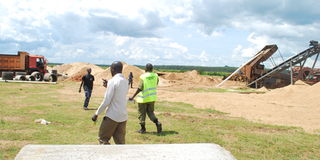Masaka authorities intervene as Chinese investors claim 30 acres of wetland

Mr Aloysius Jjuko , the chairperson Bukakkata Sub County (left), Mr January Kusiimwa, the commander Environmental Protection Police in Greater Masaka area inspecting a sand mining site in Nakiyaga wetland in Masaka District on December 10, 2022. PHOTO | RICHARD KYANJO
What you need to know:
- According to statistics from the National Environment Management Authority (Nema), Uganda’s wetland coverage has reduced from 15.5 percent in 1994 to about 13 percent today.
Authorities in Masaka District have with immediate effect stopped all activities in a section of Nakiyaga wetland in Bukakkata Sub County where Chinese investors have so far claimed 30 acres of the marshland.
The investors, who are already engaging in sand mining, are currently opening another part of the wetland for agricultural activities.
According to Mr January Kusiimwa, the southern regional environmental protection police commander, the Chinese investors who own the project were not cleared to carry out any activity in the area that is close to Lake Victoria shores and home to a large diversity of fragile species.
‘’I could have known if there was any clearance given to those investors. We have stopped any further activities on their site after finding out that they lack an Environmental Impact Assessment certificate approval, which is a prerequisite for any one operating in protected area like a wetland,’’ Mr Kusiimwa said on Saturday.
The investors were not on ground by the time the inspection team visited the site last week, but the policemen manning the site said the owners sought clearance from the neighbouring Kalungu District to carry out their activities in the area.
“We were deployed here by our bosses, but what I know, the investors got clearance from Kalungu District to carry out their activities here,” one of the police officers found at the site, who preferred anonymity, said
Mr Aloysius Jjuko, the chairperson Bukakkata Sub County, said opening the wetland for agricultural activities has caused panic among locals who use the marshland as their sole source of water.
“It will be a disservice to the community if we sit back as leaders and watch when that wetland is being destroyed. It is the only source of water for over 1000 people in the villages of Nakigga and Kasanje and the investors have already started digging trenches which will eventually cause the wetland to dry up,”he said.
He said the investors have already constructed a murrum Road through the wetland that connects to their site.
Nakiyaga wetland forms part of the Nabugabo wetland system, which comprises the satellite lakes of Lake Victoria.
The system is a protected Ramsar site, listed as one of the wetlands of international importance under the Ramsar Convention.
More than 180 birds species, among which have been globally threatened, have been recorded in the Nakiyaga wetland system.
However, Mr Richard Vvube, the Kalungu District environment officer, admitted having cleared the investors to operate in the area.
“It is true we gave them [Chinese investors] a license to operate in that area. They first applied in 2017 to grow rice and early this year, they sought another clearance to carry out sand mining which we also approved,” he said.
However, during the inspection on Friday, it was discovered that the investors had planted maize, not rice on part of the wetland.
Mr Vvube also insists that the wetland area where the Chinese are operating is located in Kalungu, not Masaka.
“We employed surveyors who discovered that area is geographically located in Kalungu and whoever doubts such findings, can go and crosscheck with the Ministry of Lands.” he added.
According to statistics from the National Environment Management Authority (Nema), Uganda’s wetland coverage has reduced from 15.5 percent in 1994 to about 13 percent today.
However, out of the remaining wetlands across the country, only 8.9 percent are still intact while 4.1 percent are degraded.
Wetland degradation has devastated the potential of storing water and filtering pollutants. This has caused natural calamities such as floods, pollution of many water bodies including Lake Victoria hence declining fish stocks.




